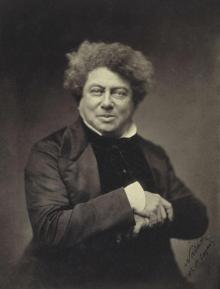- Home
- Alexandre Dumas
Man in the Iron Mask (Barnes & Noble Classics Series) Page 5
Man in the Iron Mask (Barnes & Noble Classics Series) Read online
Page 5
“Yes; but bequeathing to you so vast a power that you issue your sovereign orders and directions like a monarch.”
“He certainly did leave me a few commissions to settle.”
“And for me?”
“I have told you—a sum of twelve thousand livres was to be paid to you. I thought I had given you the necessary signature to enable you to receive it. Did you not get the money?”
“Oh! yes, yes. You give your orders, I am informed, with so much mystery, and such a majestic presence, that it is generally believed you are the successor of the defunct chief.”
Aramis coloured impatiently, and the Duchesse continued, “I have obtained my information,” she said, “from the King of Spain himself; and he cleared up some of my doubts on the point. Every general of the Jesuits is nominated by him, and must be a Spaniard, according to the statutes of the order. You are not a Spaniard, nor have you been nominated by the King of Spain.”
Aramis did not reply to this remark, except to say, “You see, Duchesse, how greatly you were mistaken, since the King of Spain told you that.”
“Yes, my dear Aramis; but there was something else which I have been thinking of.”
“What is that?”
“You know, I believe, something about most things; and it occurred to me that you know the Spanish language.”
“Every Frenchman who has been actively engaged in the Fronde4 knows Spanish.”
“You have lived in Flanders?”
“Three years.”
“And have stayed at Madrid?”
“Fifteen months.”
“You are in a position, then, to become a naturalised Spaniard when you like.”
“Really?” said Aramis, with a frankness which deceived the Duchesse.
“Undoubtedly. Two years’ residence and an acquaintance with the language are indispensable. You have upwards of four years—more than double the time necessary.”
“What are you driving at, Duchesse?”
“At this—I am on good terms with the King of Spain.”
“And I am not on bad terms,” thought Aramis to himself.
“Shall I ask the King,” continued the Duchesse, “to confer the succession to the Franciscan’s post upon you?”
“Oh, Duchesse!”
“You have it already, perhaps?” she said.
“No, upon my honour.”
“Very well, then, I can render you that service.”
“Why did you not render the same service to M. de Laicques, Duchesse? He is a very talented man, and one you love besides.”
“Yes, no doubt; but, at all events, putting Laicques aside, will you have it?”
“No, I thank you, Duchesse.”
She paused. “He is nominated,” she thought; and then resumed aloud, “If you refuse me in this manner, it is not very encouraging for me, supposing I should have something to ask of you.”
“Oh! ask, pray ask.”
“Ask! I cannot do so, if you have not the power to grant what I want.”
“However limited my power and ability, ask all the same.”
“I need a sum of money to restore Dampierre.”
“Ah!” replied Aramis coldly—“money? Well, Duchesse, how much would you require?”
“Oh! a tolerably round sum.”
“So much the worse—you know I am not rich.”
“No, no; but the order is—and if you had been the general—”
“You know I am not the general, I think.”
“In that case you have a friend who must be very wealthy—M. Fouquet.”
“M. Fouquet! He is more than half ruined, madame.”
“So it is said, but I would not believe it.”
“Why, Duchesse?”
“Because I have, or rather Laicques has, certain letters in his possession, from Cardinal Mazarin, which establish the existence of very strange accounts.”
“What accounts?”
“Relative to various sums of money borrowed and disposed of. I cannot very distinctly remember what they are; but they establish the fact that the Surintendant, according to these letters, which are signed by Mazarin, had taken thirty millions of francs from the coffers of the State. The case is a very serious one”.
Aramis clenched his hands in anxiety and apprehension. “Is it possible,” he said, “that you have such letters as you speak of, and have not communicated them to M. Fouquet?”
“Ah!” replied the Duchesse, “I keep such little matters as these in reserve. The day may come when they may be of service; and they can then be withdrawn from the safe custody in which they now are.”
“And that day has arrived?” said Aramis.
“Yes.”
“And you are going to show those letters to M. Fouquet?”
“I prefer to talk about them with you, instead.”
“You must be in sad want of money, my poor friend, to think of such things as these—you, too, who held M. de Mazarin’s prose effusions in such indifferent esteem.”
“The fact is, I am in want of money.”
“And then,” continued Aramis in cold accents, “it must have been very distressing to you to be obliged to have recourse to such a means. It is cruel.”
“Oh! if I had wished to do harm instead of good,” said Madame de Chevreuse, “instead of asking the general of the order, or M. Fouquet, for the five hundred thousand francs I require—”
“Five hundred thousand francs!”
“Yes; no more. Do you think it much? I require at least as much as that to restore Dampierre.”
“Yes, madame.”
“I say, therefore, that, instead of asking for this amount, I should have gone to see my old friend the Queen-Mother; the letters from her husband, the Signor Mazarini,e would have served me as an introduction, and I should have begged this mere trifle of her, saying to her, ‘I wish, madame, to have the honour of receiving you at Dampierre. Permit me to put Dampierre in a fit state for that purpose.’ ”
Aramis did not reply a single word. “Well,” she said, “what are you thinking about?”
“I am making certain additions,” said Aramis.
“And M. Fouquet subtractions. I, on the other hand, am trying the art of multiplication. What excellent calculators we are! How well we could understand one another!”
“Will you allow me to reflect?” said Aramis.
“No, for with such an opening between people like ourselves, ‘yes,’ or ‘no’ is the only answer, and that an immediate one.”
“It is a snare,” thought the Bishop; “it is impossible that Anne of Austria could listen to such a woman as this.”
“Well?” said the Duchesse.
“Well, madame, I should be very much astonished if M. Fouquet had five hundred thousand francs at his disposal at the present moment.”
“It is no use speaking of it then,” said the Duchesse, “and Dampierre must get restored how it can.”
“Oh! you are not embarrassed to such an extent as that, I suppose.”
“No; I am never embarrassed.”
“And the Queen,” continued the Bishop, “will certainly do for you, what the Surintendant is unable to do.”
“Oh! certainly. But tell me, do you not think it would be better, that I should speak, myself, to M. Fouquet, about these letters?”
“Nay, Duchesse, you will do precisely whatever you please in that respect. M. Fouquet either feels, or does not feel himself to be guilty; if he really be so, I know he is proud enough not to confess it; if he be not so, he will be exceedingly offended at your menace.”
“As usual, you reason like an angel,” said the Duchesse as she rose from her seat.
“And so, you are now going to denounce M. Fouquet to the Queen,” said Aramis.
“‘Denounce!’ Oh! what a disagreeable word. I shall not ‘denounce,’ my dear friend; you now know matters of policy too well to be ignorant how easily these affairs are arranged. I shall merely side against M. Fouquet, and nothing mo
re; and, in a war of party against party, a weapon of attack is always a weapon.”
“No doubt.”
“And, once on friendly terms again with the Queen-Mother, I may be dangerous towards some persons.”
“You are at perfect liberty to be so, Duchesse.”
“A liberty of which I shall avail myself.”
“You are not ignorant, I suppose, Duchesse, that M. Fouquet is on the best of terms with the King of Spain.”
“I suppose so.”
“If, therefore, you begin a party warfare against M. Fouquet, he will reply in the same way; for he, too, is at perfect liberty to do so, is he not?”
“Oh! certainly.”
“And as he is on good terms with Spain, he will make use of that friendship as a weapon of attack.”
“You mean that he will be on good terms with the general of the order of the Jesuits, my dear Aramis.”
“That may be the case, Duchesse.”
“And that, consequently, the pension I have been receiving from the order will be stopped.”
“I am greatly afraid it might be.”
“Well; I must contrive to console myself in the best way I can; for after Richelieu,f after the Frondes, after exile, what is there left for Madame de Chevreuse to be afraid of?”
“The pension, you are aware, is forty-eight thousand francs.”
“Alas! I am quite aware of it.”
“Moreover, in party contests, you know, the friends of the enemy do not escape.”
“Ah! you mean that poor Laicques will have to suffer.”
“I am afraid it is almost inevitable, Duchesse.”
“Oh! he only receives twelve thousand francs pension.”
“Yes, but the King of Spain has some influence left; advised by M. Fouquet, he might get M. Laicques shut up in prison for a little while.”
“I am not very nervous on that point, my dear friend; because, thanks to a reconciliation with Anne of Austria, I will undertake that France should insist upon M. Laicques’s liberation.”
“True. In that case you will have something else to apprehend?”
“What can that be?” said the Duchesse, pretending to be surprised and terrified.
“You will learn; indeed, you must know it already, that having once been an affiliated member of the order, it is not easy to leave it; for the secrets that any particular member may have acquired are unwholesome, and carry with them the germs of misfortune for whoever may reveal them.”
The Duchesse paused and reflected for a moment, and then said, “That is more serious, I will think over it.”
And, notwithstanding the profound obscurity, Aramis seemed to feel a burning glance, like a hot iron, escape from his friend’s eyes, and plunge into his heart.
“Let us recapitulate,” said Aramis; determined to keep himself on his guard, and gliding his hand into his breast, where he had a dagger concealed.
“Exactly, let us recapitulate; good accounts make good friends.”
“The suppression of your pension—”
“Forty-eight thousand francs, and that of Laicques twelve, make, together, sixty thousand francs; that is what you mean, I suppose?”
“Precisely; and I was trying to find out what would be your equivalent for that?”
“Five hundred thousand francs, which I shall get from the Queen.”
“Or, which you will not get.”
“I know a means of procuring them,” said the Duchesse thoughtlessly.
This remark made the Chevalier prick up his ears; and from the moment his adversary had committed this error, his mind was so thoroughly on its guard, that he seemed every moment to gain the advantage more and more; and she, consequently, to lose it. “I will admit, for argument’s sake, that you obtain the money,” he resumed, “you will lose the double of it, having a hundred thousand francs’ pension to receive instead of sixty thousand, and that for a period of ten years.”
“Not so, for I shall only be subjected to this reduction of my income during the period of M. Fouquet’s remaining in power, a period which I estimate at two months.”
“Ah!” said Aramis.
“I am frank, you see.”
“I thank you for it, Duchesse; but you would be wrong to suppose that after M. Fouquet’s disgrace the order would resume the payment of your pension.”
“I know a means of making the order pay, as I know a means of forcing the Queen-Mother to concede what I require.”
“In that case, Duchesse, we are all obliged to strike our flags to you. The victory is yours, and the triumph also is yours. Be clement, I entreat you.”
“But is it possible,” resumed the Duchesse, without taking notice of the irony, “that you really draw back from a miserable sum of five hundred thousand francs, when it is a question of sparing you—I mean your friend—I beg your pardon, I ought rather to say your protector—the disagreeable consequences which a party conquest produces.”
“Duchesse, I will tell you why; supposing the five hundred thousand francs were to be given you, M. Laicques will require his share, which will be another five hundred thousand francs, I presume? and then, after M. de Laicques’ and your own portions have been arranged, the portions which your children, your poor pensioners, and various other persons will require, will start up as fresh claims; and these letters, however compromising they may be in their nature, are not worth from three to four millions. Can you have forgotten the Queen of France’s diamonds?g—they were surely worth more than these bits of waste paper signed by Mazarin, and yet their recovery did not cost a fourth part of what you ask for yourself.”
“Yes, that is true; but the merchant values his goods at his own price, and it is for the purchaser to buy or refuse.”
“Stay a moment, Duchesse; would you like me to tell you why I will not buy your letters.”
“Pray tell me.”
“Because the letters you say are Mazarin’s are false.”
“What an absurdity.”
“I have no doubt of it, for it would, to say the least, be very singular that after you had quarrelled with the Queen through M. Mazarin’s means, you should have kept up any intimate acquaintance with the latter; it would look as if you had been acting as a spy; and upon my word, I do not like to make use of the word.”
“Oh! pray say it.”
“Your great complaisance would seem very suspicious, at all events.”
“That is quite true; but what is not less so is that which the letter contains.”
“I pledge you my word, Duchesse, that you will not be able to make use of it with the Queen.”
“Oh! yes, indeed; I can make use of everything with the Queen.”
“Very good,” thought Aramis. “Croak on, old owl—hiss, viper that you are!”
But the Duchesse had said enough, and advanced a few steps towards the door. Aramis, however, had reserved an exposure which she did not expect—the imprecation of the slave behind the car of the conqueror. He rang the bell, candles immediately appeared in the adjoining room, and the Bishop found himself completely encircled by lights, which shone upon the worn, haggard face of the Duchesse, revealing every feature but too clearly. Aramis fixed a long and ironical look upon her pale, thin, withered cheeks—upon her dim, dull eyes—and upon her lips, which she kept carefully closed over her blackened and scanty teeth. He, however, had thrown himself into a graceful attitude, with his haughty and intelligent head thrown back; he smiled so as to reveal his teeth, which were still brilliant and dazzling. The old coquette understood the trick that had been played her. She was standing immediately before a large mirror, in which her decrepitude, so carefully concealed, was only made more manifest. And, thereupon, without even saluting Aramis, who bowed with the ease and grace of the musketeer of early days, she hurried away with trembling steps, which her very precipitation only the more impeded. Aramis sprang across the room, like a zephyr, to lead her to the door. Madame de Chevreuse made a sign to her servant, who resumed his mu
sket; and she left the house where such tender friends had not been able to understand each other, only because they had understood each other too well.
2
Wherein May Be Seen That a Bargain Which Cannot Be Made With One Person, Can Be Carried Out With Another
ARAMIS HAD BEEN PERFECTLY correct in his supposition; for hardly had she left the house in the Place Baudoyer, than Madame de Chevreuse proceeded homeward. She was, doubtless, afraid of being followed, and by this means thought she might succeed in throwing those who might be following her off their guard; but scarcely had she arrived within the door of the hotel, and hardly had assured herself that no one who could cause her any uneasiness was on her track, when she opened the door of the garden, leading into another street, and hurried towards the Rue Croix des Petits Champs, where M. Colbert resided.5
We have already said that evening, or rather night, had closed in; it was a dark, thick night, besides; Paris had once more sunk into its calm, quiescent state, enshrouding alike within its indulgent mantle the high-born Duchesse carrying out her political intrigue, and the simple citizen’s wife, who, having been detained late by a supper in the city, was making her way slowly homewards, hanging on the arm of a lover, by the shortest possible route. Madame de Chevreuse had been too well accustomed to nocturnal political intrigues to be ignorant that a minister never denies himself, even at his own private residence, to any young and beautiful woman who may chance to object to the dust and confusion of a public office, or to old women, as full of experience as of years, who dislike the indiscreet echo of official residences. A valet received the Duchesse under the peristyle, and received her, it must be admitted, with some indifference of manner; he intimated, after having looked at her face, that it was hardly at such an hour that one so advanced in years as herself could be permitted to disturb Monsieur Colbert’s important occupations. But Madame de Chevreuse, without feeling or appearing to be annoyed, wrote her name upon a leaf of her tablets,—a name which had but too frequently sounded so disagreeably in the ears of Louis XIII and of the great Cardinal. She wrote her name in the large, ill-formed characters of the higher classes of that period, folded the paper in a manner peculiarly her own, handed it to the valet without uttering a word, but with so haughty and imperious a gesture that the fellow, well accustomed to judge of people from their manners and appearance, perceived at once the quality of the person before him, bowed his head, and ran to M. Colbert’s room. The minister could not control a sudden exclamation as he opened the paper; and the valet gathering from it the interest with which his master regarded the mysterious visitor returned as fast as he could to beg the Duchesse to follow him. She ascended to the first floor of the beautiful new house very slowly, rested herself on the landing-place, in order not to enter the apartment out of breath, and appeared before M. Colbert, who, with his own hands, held both the folding-doors open. The Duchesse paused at the threshold, for the purpose of well studying the character of the man with whom she was about to converse. At first glance, the round, large, heavy head, thick brows, and ill-favoured features of Colbert, who wore, thrust low down on his head, a cap like a priest’s, seemed to indicate that but little difficulty was likely to be met with in her negotiations with him, but also that she was to expect as little interest in the discussion of particulars; for there was scarcely any indication that the rough and uncouth nature of the man was susceptible to the impulses of a refined revenge, or of an exalted ambition. But when, on closer inspection, the Duchesse perceived the small piercingly black eyes, the longitudinal wrinkles of his high and massive forehead, the imperceptible twitching of the lips, on which were apparent traces of rough good humour, Madame de Chevreuse altered her opinion of him, and felt she could say to herself: “I have found the man I want.”

 The Count of Monte Cristo, Illustrated
The Count of Monte Cristo, Illustrated Knight of Maison-Rouge
Knight of Maison-Rouge![The Three Musketeers - Alexandre Dumas - [Full Version] - (ANNOTATED) Read online](http://i1.bookreadfree.com/14/the_three_musketeers_-_alexandre_dumas_-_[full_version]_-_annotated_preview.jpg) The Three Musketeers - Alexandre Dumas - [Full Version] - (ANNOTATED)
The Three Musketeers - Alexandre Dumas - [Full Version] - (ANNOTATED) The Man in the Iron Mask
The Man in the Iron Mask The Count of Monte Cristo (Penguin Classics eBook)
The Count of Monte Cristo (Penguin Classics eBook) Count of Monte Cristo (abridged) (Barnes & Noble Classics Series)
Count of Monte Cristo (abridged) (Barnes & Noble Classics Series) The Women's War
The Women's War La reine Margot. English
La reine Margot. English The Vicomte de Bragelonne
The Vicomte de Bragelonne__english_preview.jpg) La dame aux camélias (Novel). English
La dame aux camélias (Novel). English The Count of Monte Cristo
The Count of Monte Cristo Balsamo, the Magician; or, The Memoirs of a Physician
Balsamo, the Magician; or, The Memoirs of a Physician Ten Years Later
Ten Years Later The Romance of Violette
The Romance of Violette The Mesmerist's Victim
The Mesmerist's Victim Vingt ans après. English
Vingt ans après. English Le collier de la reine. English
Le collier de la reine. English Taking the Bastile; Or, Pitou the Peasant
Taking the Bastile; Or, Pitou the Peasant The Hero of the People: A Historical Romance of Love, Liberty and Loyalty
The Hero of the People: A Historical Romance of Love, Liberty and Loyalty Louise de la Valliere
Louise de la Valliere Les Quarante-cinq. English
Les Quarante-cinq. English Ange Pitou (Volume 1)
Ange Pitou (Volume 1) The Royal Life Guard; or, the flight of the royal family.
The Royal Life Guard; or, the flight of the royal family. Les trois mousquetaires. English
Les trois mousquetaires. English Une fille du régent. English
Une fille du régent. English The Knight of Maison-Rouge
The Knight of Maison-Rouge The Count of Monte Cristo (Unabridged Penguin)
The Count of Monte Cristo (Unabridged Penguin) Ange Pitou
Ange Pitou The Romance of Violette (vintage erotica)
The Romance of Violette (vintage erotica) The Three Musketeers
The Three Musketeers Three Musketeers (Barnes & Noble Classics Series)
Three Musketeers (Barnes & Noble Classics Series) Georges
Georges Man in the Iron Mask (Barnes & Noble Classics Series)
Man in the Iron Mask (Barnes & Noble Classics Series) The Red Sphinx
The Red Sphinx